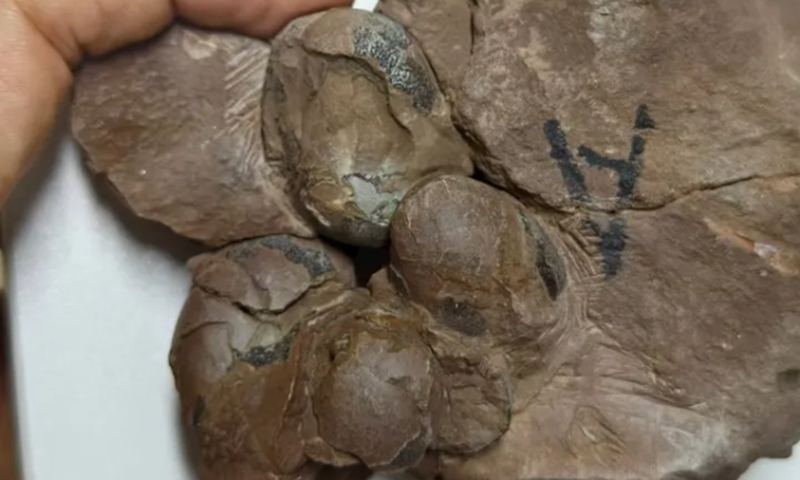
The "Ganzhou Mini Egg"
A fossilized dinosaur egg measuring just 29 millimeters in length, discovered in Ganzhou, East China's Jiangxi Province, has been identified as the smallest complete egg fossil known to date and belonging to a new species within the family of oval-shaped dinosaur eggs, according to Xinhua News Agency on Thursday.
Named "Ganzhou Mini Egg," this discovered fossil represents a significant paleontological find as it sheds light on dinosaur reproduction and diversity. The research was recently published in the academic journal
Historical Biology, marking a noteworthy contribution to understanding the evolutionary lineage of dinosaurs.
The Ganzhou Mini Egg shattered the previous record holder, the Jingguo Micro Ellipsoid Egg from East China's Zhejiang Province, which measured approximately 45.5 mm × 40.4 mm × 34.4 mm.
In 2021, a research team led by Lou Fasheng, chief engineer of the Jiangxi Geological Survey and Exploration Institute, made the discovery at a construction site in the town of Meilin, Ganxian district, Ganzhou City.
The team found a well-preserved nest of nearly six intact dinosaur eggs, arranged irregularly. The eggs were determined to be from the Late Cretaceous period (approximately 80 million years ago). After three years of research, the team, in collaboration with experts from China University of Geosciences (Wuhan) and the Institute of Vertebrate Paleontology and Paleoanthropology of the Chinese Academy of Sciences, confirmed the fossils as dinosaur eggs.
Lou said that the team utilized techniques such as electron microscopy scanning and electron backscatter diffraction to analyze the microstructure of the egg shell. Based on the macroscopic shape and the type of ornamentation, as well as the basic structure of the shell units, they classified the specimen under the ellipsoidal family of dinosaur eggs.
The newly discovered egg fossil exhibited significant differences in size, shell thickness, pore system, and ultrastructure compared to previously known specimens, leading to the establishment of a new genus and species, Lou noted.
According to Han Fenglu, an associate professor in vertebrate paleontology at the China University of Geosciences (Wuhan), the analysis of known egg fossils suggests that these dinosaur eggs likely came from a small theropod dinosaur. The discovery of the world's smallest complete dinosaur egg fossil adds to the diversity of Late Cretaceous dinosaur eggs and is significant for understanding the evolution and reproductive strategies of theropods during that period.
The research team plans to use micro-CT scanning to reconstruct the overall burial state of the egg fossils, study their formation process, and determine the specific type of dinosaur that laid them, along with its reproductive behaviors. The next phase of research aims to provide deeper insights into the life and ecology of these ancient creatures.




